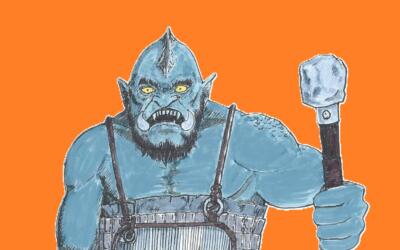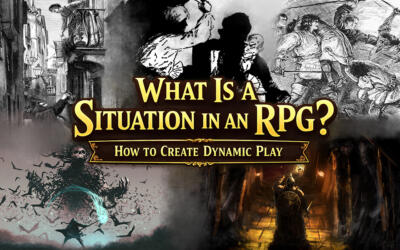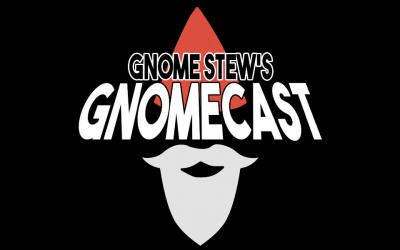Today’s guest author, Jim Dattilo, writes interactive fiction about zombies and Apocalypses, often combining the two. As a lifelong gamemaster, he runs Vampire: The Masquerade and AD&D 3.5 campaigns, never combining the two (well, almost never). He lives in Philadelpha with his wife, Vicki. Thanks, Jim! –Martin
As a kid, I was hooked on tabletop roleplaying games and “Choose Your Own Adventure” books. As an adult, I’m still hooked on RPGs, and now I write interactive fiction. I have always been fascinated with player choice and the ability of gamemasters to give freedom to those acting in their fantasy worlds. From writing CYOA-style games, I have learned a great deal in the process that has enhanced the experience of my RPG crew, namely how to build story into character building, enabling player choice within a structured plot, and how to create memorable NPCs.
Character Building Should Not Break Immersion
Building a character continues to be one of my favorite parts of starting a new RPG. Classic character building utilizes dice rolls or spending points from a development pool, all of which typically occurs prior to the start of the story. In CYOA games, we integrate character building into the start of the story to maintain immersion and to emphasize story. We don’t simply roll dice and describe a numerical measure but detail how an attribute fits into the game. “You have a dexterity of 16” becomes “raised by circus acrobats, your agility and hand-eye coordination have always been far better than average.” Character building and background are intertwined, so detailing attribute scores or skill values becomes part of the narrative.
I’m not suggesting you ditch the dice rolls but give more thought to them than which set of dice gives the most sixes. Give significance to those rolls. Reward players who give meaning to stats. Maybe a high intellect relates to a player being born in a noble house that valued education. Even low stats can provide background (“Lazeren’s low stamina is a result of years of an unknown illness that ravaged his body.”) Encourage elements of storytelling within the character-building segment to immerse the player in the story.
Player Choice: Too Little? Too Much?
In a coded roleplaying game, I can only provide a finite set of choices.
As you open the door, it flies inward from a sudden force. Falling into a side railing, you recover your balance as a zombie bounds from the abandoned home.
- I draw my weapon and attack
- I leap onto the back of the military truck speeding by
- I throw down the zombie and rush into the abandoned home
Each of these choices leads to predetermined paths of the game. No opportunities exist for a player to write in an option, no matter how dynamic a text-based adventure game can be. That’s not the case for PnP RPGs. A player can choose a path that no GM could ever predict (“I let the zombie bite me so I may become a zombie!”).
As a GM, I have always given players as much choice as possible, even at the expense of furthering a campaign. I plan and write scenes and encounters, work out NPCs for the party to meet, and labor over balancing risk and reward. Giving the player the ability to push the game in an unplanned direction eliminates the work I have done to make an enjoying gaming experience. Taking a lesson from interactive fiction, I realize players need direction. Instead of allowing choices that could dramatically alter the campaign, I give as much freedom as possible while gently (but firmly) guiding the group down paths they must travel. Otherwise, the game is really just Improv and at some point story will suffer.
Striking a balance between too little and too much choice is a never-ending struggle. Giving too few choices makes for boring campaigns. Giving too much freedom derails the game. What I do in my gaming prep is forecast possible deviations from the plot and plan for them. I develop side encounters or scenes to re-aim the player back to the main path. What if a player attacks the innkeeper who later is a source of missions in town? If the innkeeper survives, I introduce him as the secret leader of a rebel group who needs the group’s help in battling…well, you get the picture. The goal is to take players through a story, a narrative adventure, and gamemasters need to maintain the structure of that story for everyone’s sake.
Memorable NPCs
In studying creative writing, I spent considerable time learning how to create realistic characters. In CYOA fiction, NPCs must be dynamic, since they interact with the players. Readers want to connect with other characters: they want to learn about them, discover their backgrounds, influence them, and become their friends, lovers, or enemies. I admit in my early days of gamemastering, my NPCs fell into two categories:
- I wanted to play vicariously through an NPC, who was really just my player character in the game.
- I fell into the trap of creating common trope characters: the strong, silent type, the tough chick, the unlikely hero.
As I started to write interactive fiction, I came to a better understanding of the role of NPCs and how to make them more memorable — more intriguing. Now, I strive to build well-rounded characters with these guidelines in mind:
- Develop their backgrounds, skills, and stats — if you are investing in an NPC who will have a major impact on the game, develop his or her entire character. List their traits, attributes, skills, etc. I have gone as far as writing up character sheets for major NPCs and short paragraph backgrounds for minor ones. When I need to figure out how an NPC fits into an encounter or event, I’ll refer to the NPC sheet for ideas.
- Give them motivations —- people haves wants and needs, so characters must have them too. Even the simplest NPCs have goals to achieve. They may not be lofty goals (“I need 1,000 gold pieces to buy a boat”) or may even be abstract (“I long for adventure”) but the more developed the NPC’s motivation, the more real he or she becomes.
- Give them contradictions and flaws -— in real life, people act unpredictably and have complex traits. Your NPCs should too. Maybe the rugged warrior henchman is uncontrollably afraid of insects. Or the evil wizard who devours souls to gain power has a speech impediment causing him to fumble the words of spells. The message here is to develop NPCs that have flair in their personalities and have nuances for players to discover. Have NPCs act out-of-character, so just when players have figured them out, they change again. The result will be dynamic NPCs who liven up game sessions and help advance the story.
Gamer Vs. Writer
In writing my first CYOA game (Zombie Exodus, which has a free-to-play demo), I learned many techniques of storytelling, structuring plots, and creating useful characters, often benefiting from reader feedback. My roleplaying game sessions have improved as a result, which means just a bit less constructive criticism from my gaming group every Wednesday night at 7pm.

















I’ve never had a campaign suffer from “improv”. That’s how I prefer to run games after trying both that, the traditional strongly-guided type, and the gently-guided type. I’ve never found players wanting to ruin a campaign in which they have almost total freedom.
In my experience the chance of players trying to ruin a campaign is inversely related to how much freedom they have. The players want to play. They are only going to rebel if their choices are limited, which causes players to naturally look for different choices – and if those choices are resisted, they are going to look for worse choices and eventually turn it into a metagame where the players are against the GM, not the PCs against the world.
Maybe your players are special magical ponies or something, but I think most GMs find that games in which the players are given no direction aren’t so much “ruined” in the sense of “you broke my plot!” (because there isn’t one) but because it’s impossible for the GM to plan meaningfully ahead, and the players aren’t really in a very good position/mindset to create things to do, that the game ends up feeling very ‘flat’. Some people are fine with that, but many people find that kind of gaming to lacking.